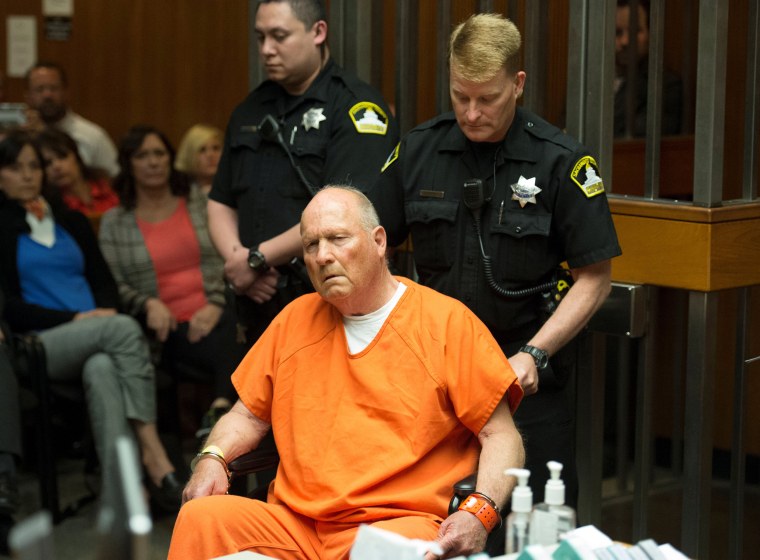SACRAMENTO, Calif. — A judge has ruled authorities can collect DNA, fingerprints and body photos of the man suspected of being California’s Golden State Killer.
Joseph DeAngelo, 72, appeared Thursday morning handcuffed to a wheelchair in a Sacramento courtroom connected to the county jail where he's being held. He did not speak in court.
Sacramento County Superior Court Judge Michael Sweet ruled in favor of prosecutors after DeAngelo's public defender, Diane Howard, filed a motion to block efforts to take DNA, fingerprints and photos of the suspect's body.
The judge said courts have repeatedly upheld collection of such evidence.
Sacramento County District Attorney Anne Marie Schubert got a warrant last week to gather the samples and photographs.
DeAngelo was arrested last week and identified as the suspect in at least a dozen murders and more than 50 rapes between 1976 and 1986.
Prosecutors said they used DNA and a genealogical website to identify DeAngelo, decades after the case had gone cold.
Prosecutors had initially planned to take more DNA and photographs on Wednesday, prompting Howard's motion to halt the action.
In a brief court appearance, Superior Court Judge Michael Sweet delayed the hearing until Thursday.
DeAngelo, in an orange jumpsuit and handcuffed to a wheelchair, appeared alongside Howard. He has not yet entered a plea.
Howard argued in a motion that the search warrant should be stopped because it was approved before DeAngelo was arrested and arraigned last week.
Prosecutors argued that the search warrant was still relevant and said collecting the evidence won't be "testimonial in nature."
The Associated Press and other news organizations have filed a motion to unseal the full search and arrest warrants for DeAngelo, which could provide additional details about the DNA techniques prosecutors used to identify him.
The decades-old cases of home invasions and brutal sexual assaults first brought fear to communities in the Sacramento area, where the suspect was known as the East Area Rapist. The attacks eventually moved to Southern California, and included a string of unsolved murders.
A motive remains unclear, although Paul Holes, a retired investigator with the Contra Costa County district attorney's office who was closely linked to the case, told NBC News earlier this week that DeAngelo may have been set off, in part, because of a failed relationship with a woman.
One victim in the late 1970s told investigators that while she was raped, she heard her attacker saying, "I hate you, Bonnie."
Holes said when authorities began looking into DeAngelo's background, they found a newspaper article from the 1960s about his engagement to a woman named Bonnie Colwell. But the couple never married.
Colwell's daughter told NBC affiliate KCRA that her mother plans to speak with the Sacramento County district attorney.

